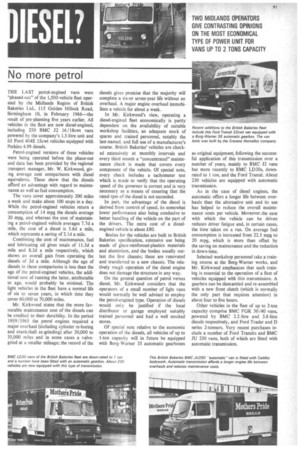No more petrol
Page 93

If you've noticed an error in this article please click here to report it so we can fix it.
THE LAST petrol-engined vans were 'phased-out" of the 1,500-vehicle fleet operated by the Midlands Region of British Bakeries Ltd., 115 Golden Hillock Road, Birmingham 10, in February 1966—the result of pre-planning five years earlier. All vehicles in the fleet are now diesel-engined, including 250 BMC J2 16 /18cwt vans powered by the company's 1.5-litre unit and 65 Ford 404E 15cwt vehicles equipped with Perkins 4.99 diesels.
Petrol-engined versions of these vehicles were being operated before the phase-out and data has been provided by the regional transport manager, Mr. W. Kirkwood, giving average cost comparisons with diesel equivalents. These show that the diesels afford an advantage with regard to maintenance as well as fuel consumption.
The vans cover approximately 200 miles a week and make about 100 stops in a day. While thc petrol-engined vehicles return a consumption of 14 mpg the diesels average 20 mpg, and whereas the cost of maintaining a petrol-engined vehicle averages 7.7d a mile, the cost of a diesel is 5.6d a mile, which represents a saving of 2.1d a mile.
Combining the cost of maintenance, fuel and lubricating oil gives totals of 11.3d a mile and 8.3d a mile respectively, which shows an overall gain from operating the diesels of 3d a mile. Although the age of diesels in these comparisons is less than the age of the petrol-engined vehicles, the additional cost of running the latter, attributable to age, would probably be minimal. The light vehicles in the fleet have a normal life of six to seven years, in which time they cover 60,000 to 70,000 miles.
Mr. Kirkwood states that the mote favourable maintenance cost of the diesels can be credited to their durability. In the period 1959/1965 the petrol engines required a major overhaul (including cylinder re-boring and crankshaft re-grinding) after 30,000 to 35,000 miles and in some cases a valvegrind at a smaller mileage; the record of the diesels gives promise that the majority will complete a six-or seven-year life without an overhaul. A major engine overhaul immobilizes a vehicle for about a week.
In Mr. Kirkwood's view, operating a diesel-engined fleet economically is partly dependent on the availability of suitable workshop facilities, an adequate stock of spares and trained personnel, notably the last-named, and full use of a manufacturer's course. British Bakeries' vehicles are checked extensively at monthly intervals and every third month a "concentrated" maintenance check is made that covers every component of the vehicle. Of special note, every check includes a tachometer test which is made to verify that the operating speed of the governor is correct and is very necessary as a means of ensuring that the rated rpm of the diesel is not exceeded.
In part. the advantage of the diesel is derived from control of speed, its somewhat lower performance also being conducive to better handling of the vehicle on the part of the drivers. The extra cost of a dieselengined vehicle is about £80.
Bodies for the vehicles are built to British Bakeries specification, extensive use being made of glass-reinforced-plastics materials and aluminium, and the bodies usually outlast the first chassis; these are renovated and transferred to a new chassis. The relatively rough operation of the diesel engine does not damage the structure in any way.
On the general question of petrol versus diesel, Mr. Kirkwood considers that the operators of a small number of light vans would normally be well advised to employ the petrol-engined type. Operation of diesels would only be justified if the local distributor or garage employed suitably trained personnel and had a well stocked stores.
Of special note relative to the economic operation of the diesels, all vehicles of up to 1-ton capacity will in future be equipped with Borg-Warner 35 automatic gearboxes as original equipment, following the successful application of this transmission over a number of years, mainly to BMC J2 vans but more recently to BMC LD30s, downrated to 1 ton, and the Ford Transit. About 230 vehicles are equipped with automatic transmission.
As in the case of diesel engines, the automatic offers a longer life between overhauls than the alternative unit and its use has helped to reduce the overall maintenance costs per vehicle. Moreover, the ease with which the vehicle can be driven reduces driver fatigue and, in certain cases, the time taken on a run. On average fuel consumption is increased from 22.5 mpg to 20 mpg, which is more than offset by the saving on maintenance and the reduction in down-time.
Selected workshop personnel take a training course at the Borg-Warner works, and Mr. Kirkwood emphasizes that such training is essential to the operation of a fleet of vehicles equipped with this transmission. A gearbox can be dismantled and re-assembled with a new front clutch (which is normally the only part that requires attention) in about four to five hours.
Other vehicles in the fleet of up to 2-ton capacity comprise BMC FGK 30/40 vans, powered by BMC 2.2-litre and 3.8-litre diesels respectively, and Ford Trader and D series 2-tonners. Very recent purchases include a number of Ford Transits and BMC JU 250 vans, both of which are fitted with automatic transmission.
















































































































































